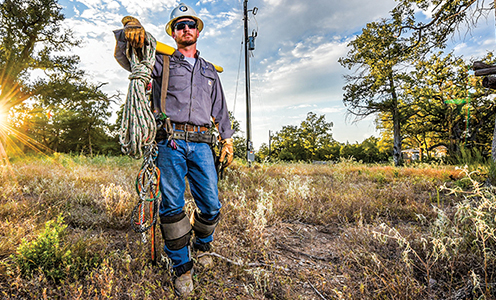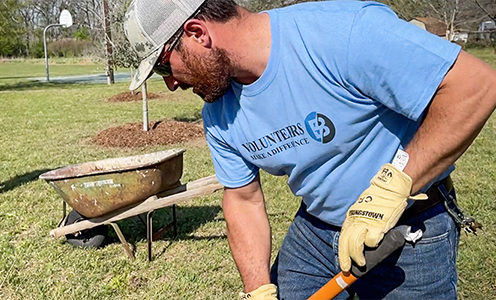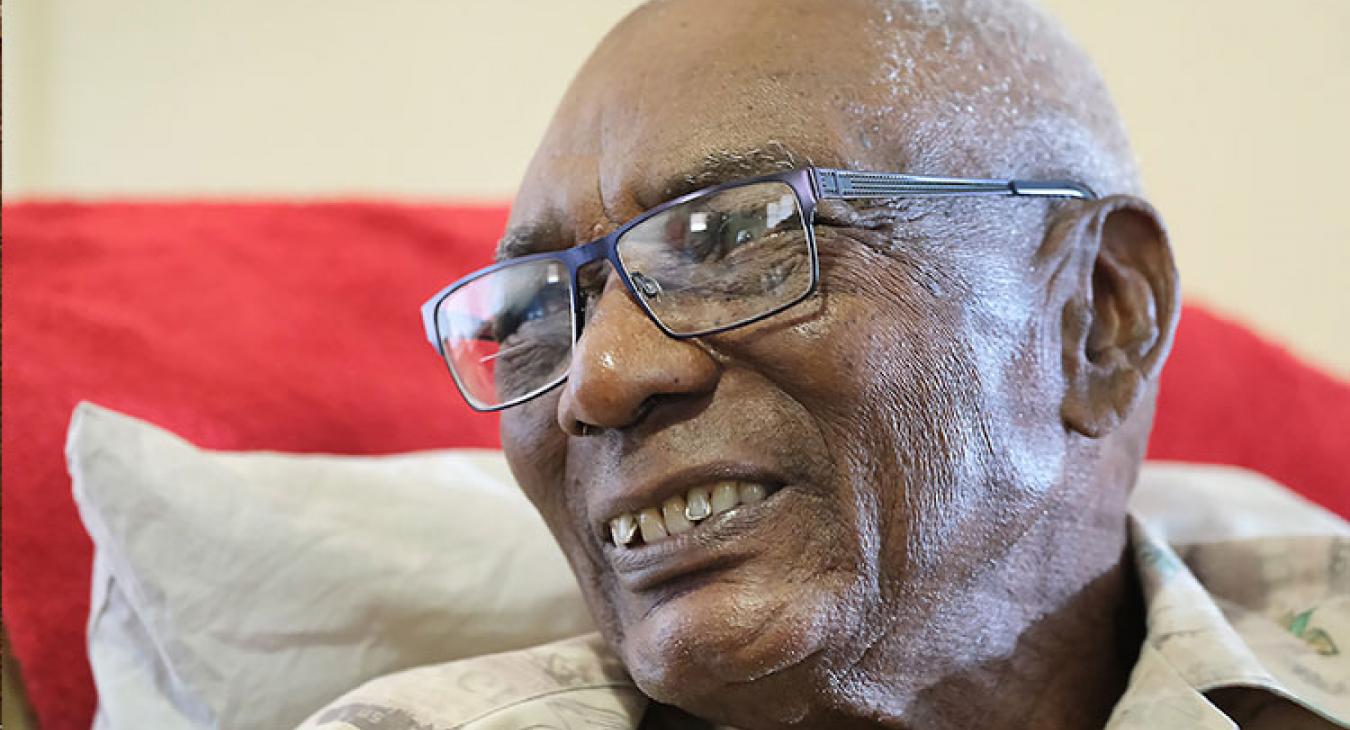Wiley Jones, 94, of Luling, is a longtime member of Bluebonnet Electric Cooperative. The first electric appliance he remembers was a refrigerator. (Photo by Ralph Barrera)
At First Light: Remembering the Dawn of Electricity
This is one in a series of stories about some of Bluebonnet Electric Cooperative’s earliest residential members
By Clayton Stromberger
Once a month, when it’s time to pay his electric bill, Wiley Jones – who turned 94 in June – slides slowly behind the wheel of his silver Chevy pickup and makes the 20-minute drive north from his apartment in Luling to the Bluebonnet member service center on West San Antonio Street in Lockhart. Then, sporting a gimme cap and a grin, he moves gingerly through the front door, assisted by his trusty walker, which has a small Bluebonnet flashlight duct-taped to the side like a mini-headlamp. Inside, the Bluebonnet member service representatives behind the counter greet him like a cherished friend.
“Hi, Mr. Jones! How are you doing today?”
“For an old man,” he replies, “I think I’m OK.”
And then Jones effortlessly segues into a story, full of specific details and comic twists — perhaps one about his recent middle-of-the-night trip to the emergency room after a home fall, or about the time a tornado almost got him and a buddy years ago on a nearby oil field. It’s the kind of vivid, unhurried storytelling you might have heard on a bench outside a county courthouse back in the day, when folks were in less of a rush.
“He makes us laugh because he has such a funny personality,” says longtime Bluebonnet Community and Development Representative Joyce Buckner, who has seen Jones just about every month since she began working at the center 32 years ago. “One time he fussed about how he didn’t know how he was going to be able to eat because he had to pay his electric bill, but we knew he was just giving us a hard time.”
Jones is among the most senior of the Bluebonnet members who come in to pay their bill in person each month and he’s one of the few who can tell stories of the days before electricity came to the rural area of Caldwell County east of Lockhart and south of McMahan, where he grew up with five sisters and his parents, Bill and Cordelia Jones.
The old Jones farmhouse still stands, off FM 86 near Fox Lane, a bit battered by the years. The home once sat amid a thriving group of African-American farming families between the small communities of McMahan and Tilmon, recalls Brenda Cooper, Wiley Jones’ niece. Cooper, 69, a longtime Dallas-area resident, was raised by Jones’ mother and father — her grandparents — in that farmhouse from infancy until she graduated from Lockhart High School in 1968.
“It was a black community with at least 20 families up and down those roads,” Cooper says, “with even more going down the road to Tilmon” (5 miles southwest of McMahan). According to historical documents and notations in a family bible going back to 1814, both lines of Wiley Jones’ family tree lead back to southern states such as Tennessee, North Carolina and South Carolina before the Civil War. “My grandfather’s grandmother, who lived to be over 100, would tell him stories of coming to Texas in a covered wagon,” Cooper recalls.
Jones’ parents were beloved leaders in the community, known for their generosity — everyone around was welcome to come get fresh spring water from their well. Like many folks of that time and place, the family farmed cotton and corn and lived mostly off the land, growing their own vegetables and killing a hog or calf when necessary. Jones’ parents also ran a small general store out by the road. Those were the days of segregation, so the children walked to a school for African-American children near McMahan, carrying a lunch pail with a fried egg and a homemade biscuit.
“They were forward-thinking people, especially for their focus on education, and they left a legacy to us,” Cooper says. Bill Jones died from a sudden heart attack in 1963 at age 64. Cordelia Jones, born in 1900, lived on at the farmhouse until her death in 1989.
Wiley Jones doesn’t recall the exact moment when the lights first came on in the family farmhouse. But he can still recapture scenes from that simpler time, especially the ones that make a good story years later.
“It used to get cold then,” Jones says. “I mean, cold. I’ve seen a chicken freeze on the roof. I said, ‘Mama?’ She said, ‘What?’ I said, ‘That chicken out there is frozen on the roof.’ She said, ‘How do you know?’ I said, ‘It’s been raining, and that chicken just froze up there.’ Daddy said, ‘Put some hot water on. We’re gonna cook that chicken.’”
The first electrical appliance Jones remembers his family getting was a refrigerator. Jones was mostly fascinated with how the thing worked. “The motor was on the top,” he says, as if still seeing it whir into action.
Jones lived on the farm until he married at age 25, he says. He and his first wife, Christine Jones, had five children before the marriage ended in divorce. Two of the children are still living: daughter Jarylen Jones of Killeen and son Ronnie Jones of San Marcos. Wiley Jones has one surviving sister, Ruth, who lives in San Antonio.
For three decades Jones worked as an industrial electrician in the Darst Creek oil fields near Luling, where he had a knack for diagnosing and fixing shorted-out well pumps. “I love electricity, I just love it,” Jones says. “I can start up anything. I can wire anything. I’ve just got a feeling for it.”
When Jones was born, Calvin Coolidge was president and Model T Fords puttered up and down the road past the family farm. He’s seen an astonishing number of changes in his time, and has moved through life’s ups and downs with a twinkle in his eye and a ready laugh. “A lot of people know history from a book, but they didn’t see it like I saw it,” he says.
Download this story as it appeared in the Texas Co-op Power magazine »





